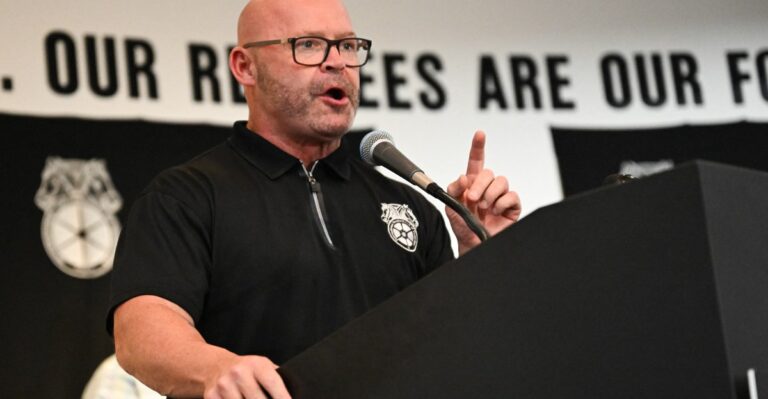The International Brotherhood of Teamsters, one of the largest and best-known labor unions in the United States, has declined to endorse any presidential candidate, citing deep political divisions among its members and dissatisfaction with each of the major candidates’ stances on key union priorities.
In a tight presidential race in which most unions are backing Vice President Kamala Harris, the Teamsters’ decision not to endorse her could be seen as a high-profile rebuke, especially since Harris is part of a Democratic administration that has generally been strong in supporting union rights. But it remains to be seen whether the decision will actually hurt Harris.
The Teamsters represent more than 1 million workers in many industries, including UPS drivers and construction, health care and sanitation workers. While its members are spread across the U.S., the Teamsters have a particularly strong base in the Midwest and in battleground states that could be decisive in the November election.
Prior to the decision, the Teamsters asked their members about their presidential preferences. In a September phone survey, 58% of members supported Republican candidate Donald Trump, while 31% said they wanted the union to endorse Harris. In a town hall poll conducted before President Joe Biden decided to drop out of the race in July, 44% of members supported Biden and 36% supported Trump.
Though polls suggest a preference for Trump, many Teamsters local unions and subgroups have been vocal in their support of Harris. The Teamsters National Black Caucus endorsed Harris in August without waiting for the national organization’s decision. Following Wednesday’s announcement, local unions in battleground states including Michigan, Wisconsin and Pennsylvania also endorsed Harris.
Now, both sides claim that Trump has the polling power and Harris has local support and the backing of the Teamsters.
Will the Teamsters’ political decisions have an impact in November?
The lack of support may not end up mattering much when it comes to how Teamsters vote: It’s clear from past polls and local endorsements that the majority of Teamsters have a preference for a particular candidate in this election, and it’s not clear that the national union’s endorsement would be enough to change that.
Peveril Squire, a political science professor at the University of Missouri, told Vox that it’s on-the-ground campaigning where union support really matters.
“Union support is valuable because it usually comes with access to resources, especially volunteers to canvass doors and do phone bank work,” Squire said. “Leaders may be able to convince some members to vote the way they want, but the real value is in campaign support.”
In addition to the disadvantage of fewer volunteers, opposition could also sway non-union voters who are sympathetic to labor issues.
“There’s broader symbolism to this lack of support,” Larry Isaac, a professor of sociology and political economy at Vanderbilt University, told Vox.
“We asked both Trump and Harris to promise not to interfere in vital union work and in Teamsters’ core industries, and to respect our members’ right to strike, but they did not get that,” Teamsters National President Sean O’Brien said in a statement. The statement, along with a larger choice not to endorse, is a clear assertion that neither candidate cares about union interests.
While there were indications ahead of Wednesday’s announcement that the union might not support Harris at all, setting itself apart from other major unions, Isaac said this wasn’t entirely shocking given that the Teamsters are often politically out of step with the rest of the U.S. labor union movement. The United Auto Workers, the United Federation of Teachers and the AFL-CIO, as well as many smaller unions across the industry and the country, have endorsed Harris.
Still, the Teamsters’ announcement may be enough to sway some voters: Americans support labor unions at the highest levels they’ve seen in decades, and some data suggests voters are more likely to support candidates they identify as pro-union in the 2022 election.
Through her ties to Biden, Harris has a strong record on labor issues: Biden was on the picket line when UAW workers struck last summer and has generally supported the right to strike and sought to weaken corporate power, but his administration forced Teamsters members back to work under a contract that union leaders deemed less than ideal ahead of a 2022 rail strike.
But while Harris supports the Protecting the Right to Organize Act, which would strengthen protections for workers’ rights to organize and bargain collectively, her own policies and values are less well known than Biden’s. Teamsters leaders, however, were reportedly not impressed by what they heard in a meeting with Harris earlier this week.
Meanwhile, during his presidency, President Trump appointed an opponent of labor unions to the National Labor Review Board and approved legislation that would restrict workers’ right to organize and increase workplace union-busting powers. Rather than focusing on pro-labor policies, President Trump has sought to win the support of the working class with a populist message in his 2024 campaign. Yet President Trump also did not seem to impress the Teamsters in a roundtable discussion with union members.


